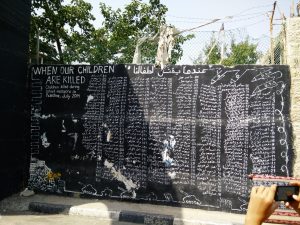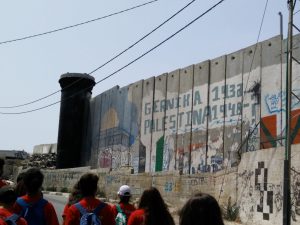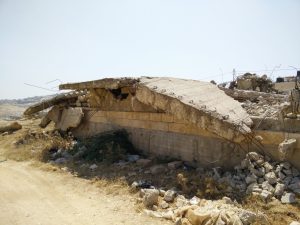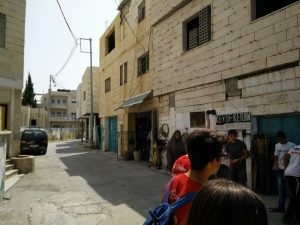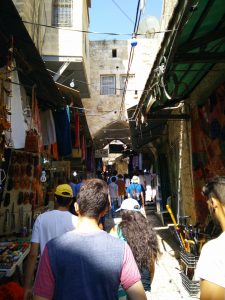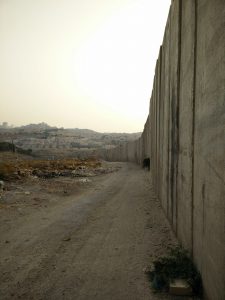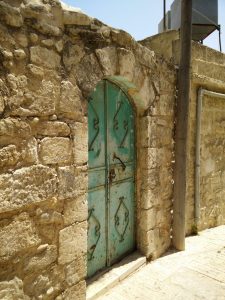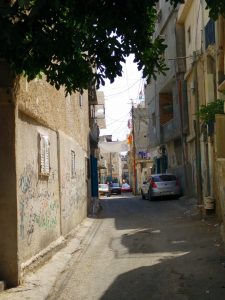At four in the morning, I was abruptly awakened by having the warm sheets yanked off my body and the curtains lifted letting rays of sun shine upon my face. My groggy mind couldn’t comprehend what was happening other than an icy blanket of cold air replacing the warmth on my skin. “Yalla ya Issam, get ready!” my father commanded. Amidst my confusion, I let out a faint grumble of protest before he started clapping his hands.
“Come on, we have to be at the border within an hour!”
Oh, right. Today was the day we were traveling from Jordan to Palestine.
We hurried out with out luggage to greet the driver waiting for us. I fell right back asleep as soon as the journey began in the van but was awoken by a sudden lurch Looking out I realized that we were at the border. Border control consisted of a small outpost on the side of a deserted highway. It truly felt that we reached the end of the earth since, besides a few dilapidated buildings, there was truly nothing else but the desert.My father and I walked to a dimly lit and uninviting office, which was no help against the sweltering heat outside.The place was dim and uninviting, and woman cradling her baby sat across from me. Perhaps she was in a similar situation,but I would never know for certain. I would later find out that these papers were our ticket into Palestine which my dad used connections and a bit of extra cash to get.
We climbed into another van and with a slight lurch we were off, going to the mystical lands of Palestine. The land that my parents constantly reminded me I was from. The source of endless conflict and bloodshed according to what I’d seen on television. A conflict with no solution, doomed to forever be stuck in a cycle of violence.
I thought a lot about what I was about to embark on. I was about to enter the Holy Land, a place where millions of people around the earth wish they could return to, or at least visit again. The millions of Palestinians around the earth who could not or were not allowed to visit their homeland and yet, I was one of the select few who could enjoy this privilege. However, I felt apathetic about it. I was only sixteen, had never visited Palestine before, and was completely ignorant about its history. I hated Israel because I only knew what my mom told me: that they stole our land and killed our children. However, I wasn’t interested enough to determine the truth of that claim. I began feeling guilty as I recognized that I was not grateful for the trip as I should have been, and that a real Palestinian deserved to be in my spot instead of me. But now that I was here, I decided to make the most of it.
Except for the long lines and the soldiers messily searching through our bags the stop at Israeli border control was relatively painless. Driving to our grandma’s house was disappointing at first because the earth was, as far as I could see, nothing but the desert. However, the closer we got to Betuina, the small village town where I was from, the more greenery I saw, the more homes and the more people milling about. However, what stuck out the most amidst the scenery were the number of settlements. These settlements freckled the land, growing and merging together, a cancer that was leeching on the Palestinians. The Palestinians couldn’t resist against the construction as they were supported by one of the world’s strongest militaries. They were built on the best plots for Jewish citizens of Israel, some of which went for ideological reasons, namely recapture of Judea and Samaria, while others simply wanted to a good housing deal. If you were unfortunate enough to have been living there before, you would be forcibly pushed away to make room and anything you had owned, including your house, was demolished. They took over all the resources from the land including 87% of the water. The malignant growth meant the Palestinians having to pay the ultimate price for it as the penniless population were spirited to lands unknown.
The white marble of the settlement buildings cast a somber glow upon the Palestinian inhabitants below it. The lavishness of these buildings also presented a dark contrast with the humble living conditions of the Palestinians. Nevertheless, we continued following the traces of civilization until we reached a checkpoint. The driver told us we were “lucky that it was so empty today, sometimes it’d be backed up for miles.” Two soldiers emerged from their booth and walked up to our window. “Awraq”, papers, they said, and my dad quickly provided them the last of our documents. They looked through them, hesitated for a bit, then let us through.
The same night at my grandparent’s house, after the lights were out, I asked myself, “What exactly was I doing in Palestine?” I would have much preferred to have spent my summer vacation with my friends back in my current home, Saudi Arabia, but my parents had signed me up for a summer camp called “GoPalestine.” They were adamant that I attend despite my many objections. GoPalestine was a program created by the heads of the “Friends School” in Ramallah, with the purpose of giving Palestinians in diaspora an opportunity to experience their native homeland (for the right price, of course). Despite GoPalestine’s altruistic mission, I was frustrated at forcefully being signed up for a summer away from the luxuries of home. I did not want to see my relatives, nor did I want to attend summer camp, and least of all, visit Palestine. I didn’t have any connection to that forgotten land and wanted to spend my summer goofing with friends and catching up on all the fun I had missed during school.
But here I was, at nine in the morning, sleep deprived, and standing in a circle with over two dozen people in red shirts branding the logo of the summer camp. The awkwardness was palpable and no one else seemed like they wanted to be there. After what seemed like an eternity of silence two camp leaders, in green shirts (referred to as “counselors”) jumped in and broke the tension right through . Their forced positivity and jokes did not boost my confidence for the upcoming experience and I wanted nothing more than to be back home. The following three weeks, however, would turn out to be the most important and the most cherished of my life.
In the span of three weeks we visited every major town in the West Bank, including the city of Jerusalem. We started out first in Ramallah, the most modern of cities in Palestine and considered by many to be the new de facto capital of the West Bank. It was mostly here that one can feel a sense of normality even if it was fleeting. Free from visible signs of occupation one can almost forget that it was occupied territory, and that more than a decade ago Israeli tanks would be patrolling the streets in a hunt for the so called “terrorists.”. Here, no settlements stood, no ugly wall jutting out from the earth. People’s expressions were less tired and many could enjoy the small luxuries of normal cities such as a café or salon. This small enclave of normalcy was confined to just that, and outside Ramallah the occupation was impossible to ignore. Outside, settlements sprung up like weeds and the Israeli army regularly patrolled the roads pulling over anyone they felt posed a threat. While we traveled on the bumpy dirt roads, we saw the newly paved and smooth roads were to be used by the Israelis only. We had to stop constantly while driving to either maneuver around an impossibly large pothole or to go through one of the many checkpoints. Occasionally, our bus would be stopped and searched by an Israeli soldier wielding his military rifle. To avoid trouble, we were all required to hold out our ID’s, look straight ahead and not dare twitch a muscle. On the way to the other cities, we would pass by homes that were obliterated, pancaked by Israel’s infamous “home demolition” policies. One would grimly wonder where the former inhabitants of that house were. Ramallah, prison, or Jordan? These were questions that would remain unanswered.
While Ramallah is more liberal and modern, the city of Nablus was more conservative. The boys in our group were required to wear jeans and the girls were required to dress more modestly and to wear a hijab if they can. Despite its conservatism, Nablus closely resembled Ramallah in appearance. The inhabitants themselves looked much older, and traditional attire were more prevalent. The men dressed in long grey dresses called “thobes” and a majority of women adorned the hijab. In Nablus stood two major forms of Palestinian resistance: an olive oil soap factory and keffiyah, the traditional black-and-white headscarf, factory. These family owned factories are one of the few remaining modicums of Palestinian self-reliance. It’s a small break against a total surrender to reliance on Israel. It was not and still is not a winning battle and the owners had/have to daily fight against Israeli bureaucracy and arbitrary rulings to keep the factory running. Thankfully, they are still up and running, and remains as a symbol of Palestinian persistence.
On the other hand, it was Hebron that showed most of the scars of occupation. The town was barely alive. For years, the town has been fighting the growing settlement community and were losing that battle, badly. Rows of stores stood desolate and closed, and what was once a thriving marketplace is now barely a shadow of it. One store was open on the day I visited, an old souvenir shop selling cheap trinkets caked in dust. The only person other than the shopkeeper were the inescapable guards. The Israeli settlers had ruled the city, they often were accompanied by the IDF (Israeli Defense Force) acting on their behalf to keep the city within their grasp, this often led to horrific consequences for the Palestinians.
The city housed one thing of value and that was the Cave of Patriarchs, the final resting spot of Abraham and and ancient mosque. Despite being under the authority of the Palestinian government, the IDF were the ones guarding it. Our group was forced to squeeze into the metal cages to wait in line for the booth. We resembled a herd of sheep waiting to be slaughtered. We stood under the hot sun, cramped and sweaty, for what seemed like hours until we were all allowed to pass through. I couldn’t imagine how awful it was during Friday prayers.
The visit to Jerusalem turned out to be the most pleasant as well as least expected. Arriving at the gates of the city the air was filled with a sense of piety and intensity. In Jerusalem, Palestinians and Jews were always in direct contact, there were no settlement gates or 12-foot walls to separate the two. Many opted to have soldiers accompany them, service the soldiers were more than happy to offer. I was within the most fought after stretch of land in history. Even before the Zionist invasion, Jerusalem has been the site of contention for all three great Abrahamic religions. The creation of the Israelites and the splitting of the Red Sea, the Roman invasions, Crusades, Ottoman acquisitions, and the British Mandates, it all happened here. The city stood atop a small hill with ancient walls surrounding it. Nine gates were the only entrance into the city and before we could enter the “Damascus Gate,” the women needed to adorn a full body Abaya. The city itself is ancient. Everything was built out of a yellow rock. It was cramped as well, and we pushed our way through people to make it to the Temple Mount, the site containing the Dome of the Rock and Al-Aqsa mosque. The path to the Mount was aligned with various vendors trying to sell you souvenirs or other religious memorabilia, which was a stark contrast to the empty streets of Hebron. We passed one more gate before the we got to the Temple Mount, it was breathtakingly beautiful. It seemed endless with its immaculate white stone flooring reaching as far as they eye can see. Immediately I was greeted with the iconic Dome of the Rock, where the prophet Muhammad (pbuh) ascended to heaven. According to Islamic history, the lesser known but more heavily regarded mosque, the Al-Aqsa, was to the left. Muslims would pray facing this mosque before God changed it to qiblah in Mecca. The atmosphere on the mount was much more relaxed than any other part of Jerusalem. Here there were no guards to destroy the scenery and everyone generally had an expression of calm and content, no occupation could distract from the religious satisfaction they must have felt here.
I would describe Palestine as a tragic beauty. The land was pretty no doubt about that. It has a unique combination Mediterranean vegetation with Arab desert. The lakes, climate, and location all made it extremely pleasant to be in. Apart from historic and identity reasons it is clear why it’s been fought over for decades now. However, despite it’s beauty you can never truly escape the ugliness the occupation. The giant grey wall that runs through the land of Palestine and dividing everything in its path. The soldiers with their regular patrolling; unwelcome guests that you could do nothing about. They were viewed as the cause of the Palestinian suffering, the ones enforcing the occupation by any means necessary. The soldiers and settlers view always viewed the ones responsible for the loss of their land and dignity; a masterpiece vandalized.
You could also see it on people’s faces. People so utterly devoid of hope and happiness, simply existing. Each day was a barrage of bad news and new disappointments. Children killed, land stolen, failed peace talks, all were to become part for the course. The image of Palestine of a peaceful flourishing nation only existed in the stories of mothers told their children. They speak of a time before the occupation, and before the war. Some so fiercely held on to this image of perfection that they would do anything to make it a reality. Others let it go and accepted the bitter reality as a permanent one. Whatever the future holds for Palestine, it will not be reached passively, but rather heroically fought for with hearts filled with determination and rage. While I got to return home to the luxuries of a comfortable life, those that I left behind were sentenced to live under a brutal occupation. A life full of uncertainties and injustices wheresome may flee for a better one, but many others, whether from pride or financial, would stay. And those are the ones keeping Palestine alive, and protecting it from its existence from being scrubbed away. Palestinians around the world owe everything to the brave ones that stayed and continued fighting for their right to exist.
I returned from Palestine completely changed, and almost a different individual. The beauty combined with the despair that I had seen would forever change how I perceived this tiny sliver of land, including the entire world. It filled me anger at how such injustices could occur with no consequence, no punishment. Being Palestinian was more than just an identity, it was to keep it alive. To prevent the cleansing of our people and history. Ever since then I had proudly worn the badge of being Palestinian, not to take credit for actions I did not commit, but to resist even in the smallest way possible. I am a Palestinian and I am not going to go down without a fight.
Photos by Issam Ismail

